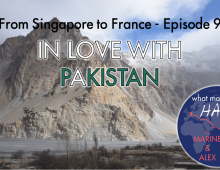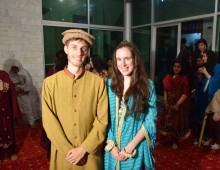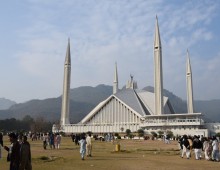We went back right in Islamabad to carry on our trip. We had left Islamabad a few days before when we had suddenly decided to spend Christmas back in France with our families and friends. Fun fact for us wishing not to take any plane, we spent New Year’s Eve right on the plane, between Abu Dhabi and Islamabad. Not to say that, because we flew between two Muslim countries, we celebrated the new year with mango juice as no alcohol was allowed on board!
After a few days in Islamabad, we took a train to Lahore. We were excited to discover a new part of Pakistan that a lot of people had described to us as “the cultural heart” of the country. We set up our quarters in a guesthouse called Lahore Backpackers, along a busy street full of traffic. After catching a cold and getting several hours of sleep to recover, we were ready to plunge in Lahore, that we had also perceived as much more lively than the few other cities we had seen before in Pakistan.
Our culture discovery started with Lahore Fort, a huge citadel built a very long time ago (at least the 11th century but traditional myths say the city itself is much more older) and periodically destroyed and rebuilt until the 16th century. The Fort is an example of Mughal architecture. The huge Mughal Empire was established in the Indian subcontinent and in Afghanistan between the 16th and the 18th century. It was ruled by a Muslim dynasty from central Asia (Turco-Mongols). Among the rulers, Shah Jahan is well known for being the commissioner of the Taj Mahal in India (also a great example of Mughal architecture).
The citadel was quite big and we were surprised to see families hanging out on the lawn inside the fort and in the park around, making it the perfect Sunday afternoon promenade.
After that, we went to Badshahi Mosque just next door, stunning! (and again a great example of Mughal architecture)
We also visited another Mosque in the old city, Wazir Khan Mosque, the most exquisite mosque we had ever seen. Beautifully and colorfully decorated, with a big space in the middle for us to enjoy the peaceful atmosphere and for the faithful to pray.
We also got lost in the small alleys of the old city. We even came by a traffic jam involving a truck, a horse, a donkey, motorbikes and rickshaws!
Surely Lahore is the most boiling city we have ever seen in Pakistan, a good introduction to our plunge in India!
One evening, we met with Talha, a friendly Pakistani (knowing that Pakistani already means friendly, you can imagine how friendly he was!). He made us discover Anarkali food street just a couple of blocks away from our guesthouse.
We had tea and a good dinner, and above all a good chat! He is passionate about travelling!
We got on so well together that we went together to attend the Wagah Border ceremony. Wagah Border is a famous border between Pakistan and India, famous because of its flag down ceremony held everyday when the sun sets down and to which hundreds of people attend. The border figures two gates (one for each country) on the road from Pakistan to India. On each side of the road, the two countries have built stands for the people to seat, as if they were attending a sports match. When we went there, we sat on the Pakistani side. We could see on the Indian side that India is building a huge seat zone and it will soon look like half a stadium on their side!
The ceremony itself was amazing. Officers on both sides realize the same choreography, a mix between a ballet dance and an All Blacks’ Haka in which they show both their flexibility (their leg rise is amazing) and their power (they rise their arms as if showing their muscles). All of this under the cheering of the crowd crazily yelling “Pakistan Zindabad” (Long Live Pakistan). A great moment!
When the ceremony was over, people rushed to take pictures with the officers and we realized how tall they were! We imagined what the job interview for working at Wagah border would be like: measuring your height and how high you can lift your leg!
A few days after, time came to leave Pakistan. So we physically crossed the border. We went with our big backpacks in the middle of all the people coming to watch the border ceremony. Policemen were surprised that we crossed the border instead of stopping to watch the ceremony. They must not see a lot of travellers crossing the border! Passing between the stands and crossing the gates was an important moment of our trip. Finally arriving in India by land and leaving Pakistan that we had loved so much made it emotional, especially in front of the crowds!




Thanks for the kind words. It was a pleasure spending time with you guys
Je n’avais jamais envisagé de mettre les pieds au Pakistan… je pense que je viens de changer d’avis 😉
Merci Natacha !! Si tu as besoin d’infos n’hésites pas ! On s’est décidé aussi grâce à un couple de français qui y sont allés. Ils étaient partis pour 2 semaines… ils sont restés 6 mois ! Quand ils nous ont dit ça, on a foncé !
Que de beaux souvenirs grâce à votre article! La céremonie de Wagah ‘Border’ était vraiment surprenante, je n’en avais jamais entendu parler avant d’y aller.
Vos photos sont superbes et me permette de me replonger dans cette ambiance si particulière .. et tellement chaleuresue. J’ai hâte de retourner dans ce beau et pourtant si méconnu pays.
Merci beaucoup Claire !! Oui c’est tellement dommage que le Pakistan soit si peu connu et apprécié. Nous aussi on a hâte d’y retourner ! Au printemps cette fois, pour la floraison des cerisiers sur la vallée de la Hunza ! Il parait que c’est magnifique !
Ohlala .. petite correction indispensable: les photos me permettent / chaleureuse. Je devrais me relire avant de poster 😉
J’ai assisté, l’an dernier, à la Wagah, mais du côté indien (en venant d’Amritsar). J’en ai gardé un souvenir mitigé. J’aurais voulu comprendre les paroles du”chauffeur de foule” et les réponses que faisait la foule. Le ton général m’a paru plutôt inamical et même agressif. Cela m’a semblé être du genre: “Restez de votre côté de la frontière, sinon vous le regretterez! Nous sommes prêts à vous recevoir!”.
Nous étions mal placés pour apercevoir ce qui se passait juste entre les deux portails, mais on nous a affirmé que la cérémonie (ou la fête?) se termine chaque jour par une poignée de main qu’échangent les deux officiers. Ouf!…
A part cela, il est vrai que les danses endiablées, pendant les intermèdes (exécutées seulement par les femmes, dont mon épouse) étaient plaisantes et très colorées.
C’est en effet une démonstration de force des deux côtés ! Les Pakistanais crient “Pakistan Zindabad!” (Longue vie au Pakistan) et les Indiens crient de leur côté “Hindustan Zindabad!”
Et avec la construction des gradins sur plusieurs étages côté indien, il y a maintenant bien plus de spectateurs chez les indiens que chez les pakistanais !